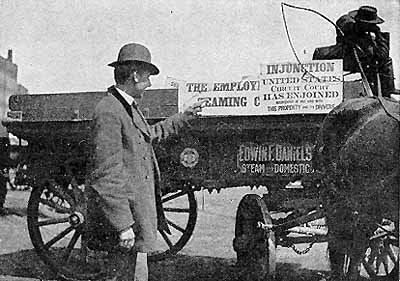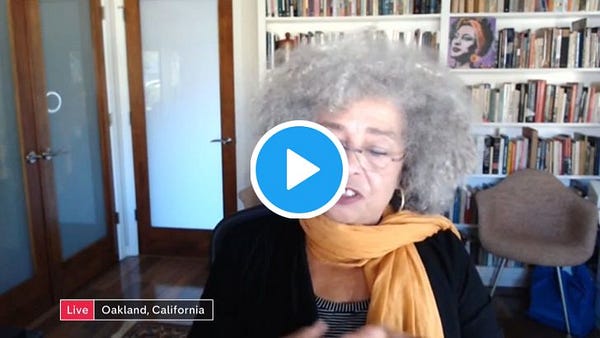
Boy, things just don’t stop happening, huh? Say what you will about Lenin, but “there are decades where nothing happens, and there are weeks when decades happen” was really a prescient bit of analysis.
One of the clearest—and radical—changes we’ve seen sweep the country is the call to defund the police in the wake of George Floyd and Breonna Taylor’s murders by officers in Minneapolis and Louisville. You can tell that it’s working because the attempts to co-opt and confuse that demand have been coming in hard and fast from Democratic electeds and liberal wonks: When they say defund, they actually mean reimagine! They don’t really want to take away money from the police, they want more funding to recruit and develop better cops!
Bzzt. Wrong.
When considering demands like “defund the police” it’s critical to examine the role of police in society, especially their economic function: on the micro- level by being the agents of collection for municipalities, who empower police departments to invent crimes and violations to keep the city’s coffers full; on the macro- level by protecting private and productive property while terrorizing communities into a semblance of order that maintains the hegemony the ruling class. That the communities they almost exclusively spend their time terrorizing are black, brown, and poor is perhaps a given but should be noted regardless.

So police are not workers, that class who must strive to earn a wage at the behest of the capitalist class, from the socialist perspective. They literally have jobs, yes, but in practice they are the armed wing of that ruling capitalist class, a group whose interests are counterposed to those of everyone else on earth. There’s a reason that you never hear about a government trying to break a police union. In fact they’re the first ones sent in when the rest of the working class gets bold enough to strike, especially in strategic industries. The “order” they protect when they go about shooting Teamsters or miners or textile workers, when they try to intimidate teachers or escort scabs into a factory, is not an order that’s in your interest.


I have a chance to help vote the Seattle Police Officers’ Guild out of the King County Labor Council this coming week. It’s a responsibility I take very seriously, and the notion that we might actually accomplish something so drastic in such a short timeframe makes me feel a degree of hope. Hope that things can change, hope that Seattle can set an example, hope that there is a future in which “Black Lives Matter” is an uncontested truth and not a desperate plea. Every day for me is a delicate balancing act between that hope and the kind of insidious despair that comes from spending years as a part of an ineffectual and flailing Left just beginning to reckon with the magnitude of the forces arrayed against it.
Something that tipped the scales back toward hope for me this week was listening to a podcast called TrueAnon, which emerged in the aftermath of Jeffrey Epstein’s arrest last summer and has since built a cult following for its “sicko hunting,” conspiracy explaining, and Left political commentary. A bizarre place to find peace, I admit. But the last 31 minutes or so of the episode were particularly powerful and I did my best to transcribe a few of the best bits. Host Brace Belden said:
I think that you have to believe in possibilities at least, and even though those possibilities aren’t met, often, with real action, they’re still possibilities. And I think that’s what feels so different right now, because I think people are seeing in these riots—they are seeing the strength of people against a militarized…in some places, a lot of black neighborhoods, it’s like an invading army! That’s what the Panthers used to call them. And it’s true!…[But] seeing people engage with the state in a physical way…you can see in them the faint outline of something beautiful, and I think that gives a lot of people of my political persuasion—it makes them giddy in a way.
His co-host, Liz Franczak, had earlier contended that
I think part of beginning a serious Left project…is being honest about understanding the forces at work that limit our power, but without abandoning our responsibility to change the world. And you can hold both of those things at the same time.
So we have to do a lot of thinking about the contradictions of the current moment and how they influence our work. This random podcast isn’t the only entity wrestling with our grim political reality and a sort of revolutionary hope—no less an icon than Angela Davis said this week that this is a very exciting moment, the most hopeful she’s been in a long time.


I feel that way too, on the days (or more precisely in the hours) when I can ignore the ouroboros of the maximalist Online Left, who often stake out the most extreme position on every issue and then attempt to smear or discredit anyone who asks them to pause and take a breath. This is not a phenomenon specific to anarchy but it does highlight one of my biggest critiques of anarchy: namely, that many anarchists orient themselves toward the world as they wish it already was rather than how it actually is. There’s a sort of “If you build it, they will come” ethos to the whole project—embodied by the Capitol Hill Autonomous Zone (CHAZ) that sprang up in Seattle this week—that says or implies that the best way to start a revolution is to assert a full program of revolutionary demands. Very little attempt, if any, is made to win over those who don’t currently have a material reason to agree; there is no anarchist program for meeting socially conscious liberals or even the apolitical poor where they (philosophically) are and bringing them along. I went for a run in my neighborhood the other day, venturing into the streets where people own their trendy-looking homes, and they were all there. Gardening or playing basketball or talking to their neighbors, that kind of thing. They were not down at the barricades just a few miles southeast.
(My other main critique of anarchism, if you were curious, is that I think it’s folly to believe abolishing state power is a preferable outcome to wielding state power. State power is the biggest, heaviest lever there is, meaning it’s the hardest to move. But moving it has a greater impact than turning all the small levers at once by trying to reinvent public works and food supply chains and water supplies and hospitals and pharmaceutical manufacturing and god knows what else all at once.)

Anyway. Belden continued:
What I worry about is that people get caught up in this moment after moment after moment after moment and don’t realize, like, a political future doesn’t come in moments that are handed to us, really. It comes in the long slow work of, I believe, building a party. And you said something earlier about shortcuts. I think a lot of people do think that there are shortcuts, that we’ll simply just piggyback on a movement that’s already happened. But there are no fucking shortcuts! You actually do have to, like, look at history and take a look at now, and you have to apply the lessons of the past to the present, right, as much as you can, and be smart about it. And I don’t think a lot of people do that. I think a lot of people kind of get caught up in this fervor, and it’s easy—it’s easy to get caught up in a fervor. Everyone loves a fervor. We on the left here, we don’t get as many fervors as those on the right do, so we take them very preciously.
That’s important to remember, that bit about fervor. In just under four years of actually participating in Left spaces as an activist and organizer I have seen a lot of losses and a lot of outbursts of energy and positivity that ultimately went nowhere. It’s easy to get cynical and jaded by that. It’s easy for me to look at something like the CHAZ and say, okay, you’ve only taken over space that was already public, not private; you’ve got this whole long list of demands but no program for winning them; you don’t exist “outside of capitalism” like some of you are saying you now do.
But I also have to look at that and see clearly that a lot of otherwise “normal” people in my life (by which I mean people who have not spent the past four years getting scolded at meetings and fighting on Twitter) are taking in the CHAZ and starting to think, maybe for the first time, that the world can look different than it does. Maybe they’re starting to have hope. And I have to remember that all the mistakes I’ve made—I can’t make those for other people. People have to come around to big ideas in their own way, and the best I or anyone can do is kind of nudge them along. If I dismiss them outright for believing in something, without any experience that tells them not to, then that means I’ve become totally insular and “online.” That’s the last thing you want to be if your goal is to get out into the world and help put your shoulder into Sisyphus’ boulder.

Cultivating understanding and positivity when you’ve been trained to be cynical is crucial. Here’s Franczak again:
There’s a perverse enjoyment that people have with saying that nothing will ever change, and it’s almost like a decadence that has been built in, where you’re trusting what the system has told you about itself, right? Even if it’s not explicit. That there is a sort of—to have this blind faith that everything’s a dead end and nothing will change has its own sort of optimism built in. And it’s not just the kind of foreclosure on the future that [Capitalist Realism author Mark] Fisher talks about, but it’s almost like there’s a—a perverse enjoyment, that I really want to push back on. I don’t think that we have to have wanton optimism or cynical pessimism.
And one last quote from Belden to bring the point home:
There are people out there that for lack of a better term are labor pessimists…they forget that as socialists we do believe that people are capable of incredible things. I mean they’ve overthrown governments, incredibly powerful governments, before. And to just—if you foreclose the possibility of that ever happening, you will never take the first step towards making that happening. And I think a lot of people are comfortable in that zone, because if you don’t believe in possibilities, then no possibilities will ever present themselves to you. There’s no such thing as a possibility, you can just shut the door on them no matter what.
…if I didn’t believe that, then I wouldn’t…have any political allegiance. I would just purely be a nihilist.
Now, a necessary part of this is also a willingness on the part of the actors to engage in a measured critique of their own program: its successes, its shortcomings, its achievements and lack thereof. The CHAZ is nascent and as a result I have not seen much in the way of that from the people involved, but I do hope it emerges—not just once, but as a regular method of cultivating political maturity and recognizing that “at least we’re trying, and nobody’s perfect!” is both completely true and wholly insufficient.
In the days it took me to write this a thoughtful, critical summary was published by someone I know from my earlier DSA years. He explains the positive elements well (emphasis mine):
But why in a time of such hopelessness for the left are people so reluctant to just simply enjoy when good things happen? And a good thing has happened! Through political pressure, through courage in the face of a violent and unrestrained police force, through organizing, protesters, for the most part regular people, have forced the police to retreat. And it was a retreat, no amount of cynical hair-splitting will change this. This is not a military confrontation, it is a political one. The protesters were never going to overrun the precinct, but they made the situation untenable. The spectacle of nightly confrontations, the calls for Mayor Durkan to resign, the “tear gas ban” debacle, something had to give, and through their persistence it was the police. In a country whose relationship to power is most often characterized by a sickening, boot licking servility, this is a victory. I have serious political disagreements with both anarchists and the BLM activists that made up most of the active edge of these demonstrations—many people on the left do. No matter where you are on the left, however, people feeling empowered, feeling more willing to question systems that have been normalized and made invisible -- these are good things. We should allow ourselves to be heartened. These people accomplished something. They have every right to celebrate.
I’m going really long here but the following paragraph about where the CHAZ is failing to rise to the moment is also worth your time.
There are already grumblings about [Seattle city councilor Kshama] Sawant “hijacking” the movement, or diverting attention away from racialized police violence and towards existing SA campaigns, namely taxing Amazon. But this is a mistake. Sawant and SA have correctly assessed that police violence is not a free floating issue or a matter of policy. They see racism as a creation and servant of capitalism and previous forms of economic domination. They see police brutality as similarity inextricable from large systems of domination, including American imperialism. A battle against racialized police violence has to also be a battle against the structures that sustain and support it. There is no hijacking, no diversion. Instead, they are taking this struggle as a serious fight that can be won. Racialized police violence is still the center focus, but a struggle against such violence has to take place on multiple fronts in order to be successful.
I think ultimately no one really knows what comes next, what small accidents of fortune or fate will shift the timeline or the public perception in such a way as to make a victory here possible. So while we push toward that unknowable frontier, our responsibility has to be to one another: in kindness, yes, but also in valuing debate and principled disagreement. That’s absent from the Left these days, especially in Seattle, passive aggressive capital of America, where picking apart an idea is often treated as picking apart the person behind it. We are out of practice disagreeing with each other. An honest assessment of the terrain is necessary, as is a recognition that experience and expertise are valuable and that people taking a different approach than you might actually have reasons for doing so.
Thanks for reading. If you liked what you read here, please feel free to share it. I’ll talk to you next week.
-Chuck



